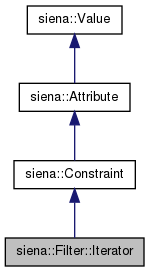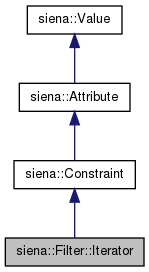interface of a generic filter iterator. More...
#include <attributes.h>
Inheritance diagram for siena::Filter::Iterator:

Collaboration diagram for siena::Filter::Iterator:

Public Member Functions | |
| virtual bool | next ()=0 |
| moves this iterator to the next attribute in the sequence. More... | |
| virtual | ~Iterator () |
| destructor | |
 Public Member Functions inherited from siena::Constraint Public Member Functions inherited from siena::Constraint | |
| virtual | ~Constraint () |
| virtual destructor | |
| virtual OperatorId | op () const =0 |
| returns the operator defined for this constraint. | |
| virtual bool | covers (const Attribute &a) const |
| applies this constraint to an attribute. More... | |
 Public Member Functions inherited from siena::Attribute Public Member Functions inherited from siena::Attribute | |
| virtual | ~Attribute () |
| virtual destructor | |
| virtual String | name () const =0 |
| returns the name of this attribute. | |
 Public Member Functions inherited from siena::Value Public Member Functions inherited from siena::Value | |
| virtual | ~Value () |
| virtual destructor | |
| virtual TypeId | type () const =0 |
| returns the actual type of this value. | |
| virtual Int | int_value () const =0 |
| returns this value as an integer. More... | |
| virtual String | string_value () const =0 |
| returns this value as a string. More... | |
| virtual Bool | bool_value () const =0 |
| returns this value as a boolean. More... | |
| virtual Double | double_value () const =0 |
| returns this value as a double. More... | |
Detailed Description
interface of a generic filter iterator.
provides sequential access to the constraints of a filter.
- Examples:
- simple_attributes_types.cc, and simple_attributes_types.h.
Member Function Documentation
|
pure virtual |
moves this iterator to the next attribute in the sequence.
- Returns
trueif the constraint pointed to by this iterator before this call to next() is not the last one in its filter. In this case, after this call to next(), this iterator will point to the next constraint.
falseif this iterator points to the last constraint or to the end of the sequence. In this case, after this call to next(), this iterator will point to an invalid constraint representing the end of the sequence.
- Examples:
- simple_attributes_types.h.